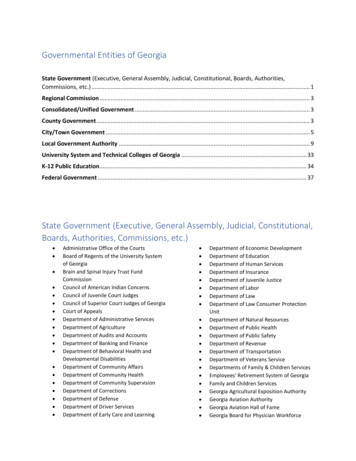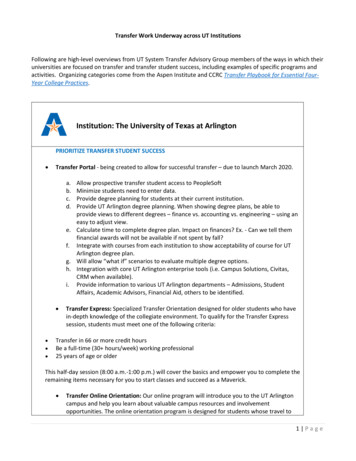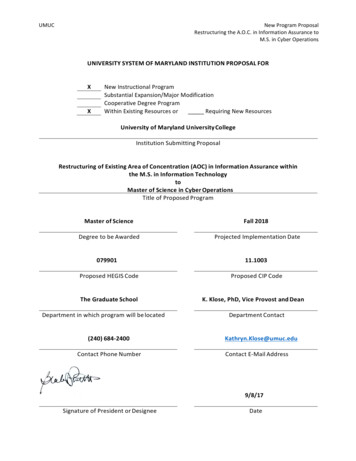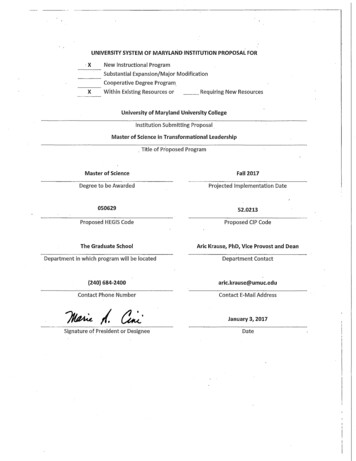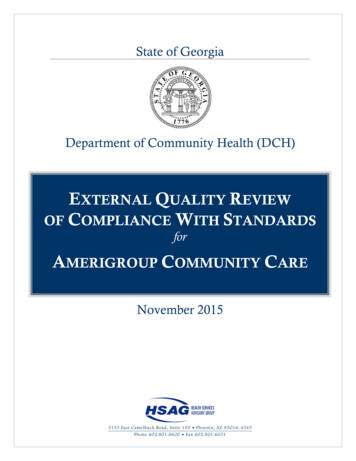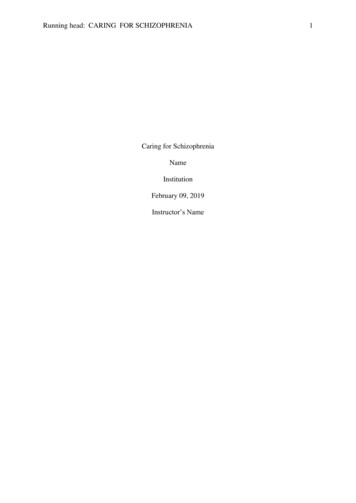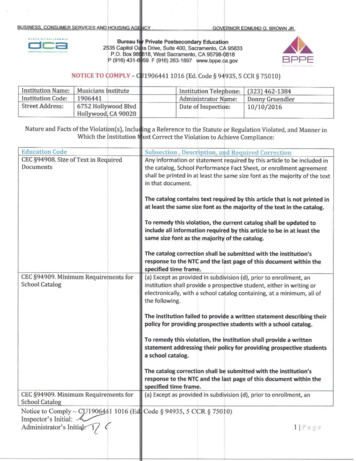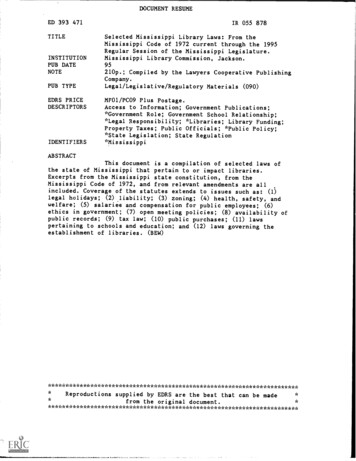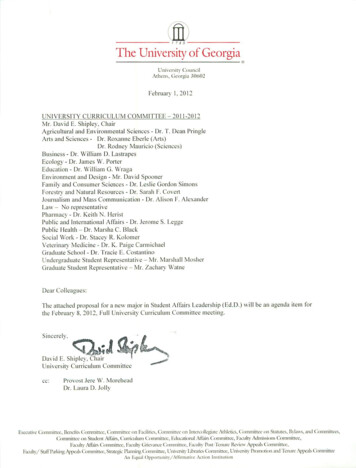
Transcription
Institution: University of GeorgiaInstitutional Contact: Jere Morehead, Vice-President and ProvostDate: December 2011School/Division: College of EducationDepartment: Counseling and Human Development ServicesDepartmental Contact: Rosemary E. Phelps, Ph.D.Name of Proposed Programs/Inscription: Doctor of Education in Student AffairsLeadership (Griffin Campus)Degree: Doctor of Education (Ed.D.)Major: Student Affairs LeadershipCIP Code:Anticipated Starting Date: Summer 2013In order to fully understand this program proposal it is necessary to place it in context. Inthe spring of 2007, the Regents Administrative Committee on Student Affairs (RACSA),which includes all 35 Chief Student Affairs Officers in the USG, discussed the need forcreating a more flexible doctorate degree for their staff. There was substantial agreementthat they would support the program, both in terms of personnel and by encouraging theirstaff to participate.With the assistance of Tonya R. Lam, Associate Vice Chancellor for Student Affairs withthe Board of Regents of the University System of Georgia, and Kris Biesinger, AssistantVice Chancellor for Advanced Learning Technologies with the Board of Regents of theUniversity System of Georgia, an online survey was conducted in September 2007. Thesurvey was designed to gauge the level of interest in master’s and doctoral programs. Atotal of 1,198 individuals responded. Of the 591 respondents who already have aMaster’s, 541 said they would like to enroll in a doctoral program, with 260 saying theywould like to begin fall 2008. Most were interested in either a Higher Education orStudent Affairs doctorate at that time. The respondents were from throughout the state,representing 32 USG institutions and 7 other universities. Currently there are at least 30public four year and 25 technical colleges in the state. There will be turnover amongstudent affairs professionals at these institutions and a continuing influx of newprofessionals who may want to advance in the profession and ultimately assumeleadership roles. Thus the sustainability of the program is anticipated to be long lasting.
2Regarding the preferences for delivery methods for the doctorate:- 85% indicated need for a part-time program.- 72% were interested in a program that combined face-to-face classes in aconvenient location, online, and video conferencing.- 92% were willing to attend courses on the weekend once or twice a month.- 93% were willing to attend a one-week class in the summer.- 72% were willing to attend 2-week class in summer.RACSA reviewed the findings and created a committee to further develop a proposal:- Chair: Dr. Bill Schafer, Vice President for Student Affairs, Georgia Tech- Dr. Rodney Bennett, Vice President for Student Affairs & Dean of Students,University of Georgia- Dr. Diane Cooper, Professor of Counseling & Human Development,University of Georgia- Dr. Darryl Holloman, Assistant Vice President of Student Life, ColumbusState University- Dr. Kurt Keppler, Vice President for Student Affairs, Valdosta StateUniversity- Dr. Melanie McClellan, Vice President for Student Affairs & EnrollmentManagement, University of West Georgia- Dr. Tom Walter, Vice President for Student Development, Gainesville StateCollegeThis proposal includes the results of this committee’s work as well as the UGA CollegeStudent Affairs Administration faculty.1. Program Description and Objectives:a. Objectives of the program1. Provide a doctoral-level education for student affairs professionals in the state ofGeorgia who are employed full-time and need a part-time doctoral program.2. Educate scholar practitioners who will lead their institutions in creating enhancedand effective environments conducive to student learning and development.3. Create doctoral-level educational opportunity for student affairs professionals atinstitutions in more rural settings or from institutions that do not offer postmasters education.b. Needs the program will meetThere are many mid-level administrators in our 35 University System of Georgia collegesand universities who have the potential to move into senior Student Affairs leadershippositions, and who are interested in pursuing the doctoral degree. Unfortunately, the onlyoptions for most of them are either to quit their jobs, moving to Athens or out of state topursue a doctorate, or to pursue a doctorate online. No other doctoral programs of thiskind are available at USG institutions; the Ph.D. program at UGA is intended for
3candidates interested in research-intensive academic position. Alternative onlinedoctorates vary greatly in quality and some are very expensive.The program will be sustainable for the foreseeable future both because there arepresently many people working in college student affairs in Georgia who are activelyinterested in pursuing doctoral work. These CSAA employees are supported by theirhome institutions and by the Board of Regents. We have created a comparable programin another disciplinary area (Counseling and Student Personnel Services) at the Gwinnettcampus, and it has enjoyed strong success.Student affairs divisions typically include the following functions:Student activitiesGreek LifeAdmissionsConductResidence life and housingAssessmentMulticultural Service and ProgramsDisability servicesCounseling and psychological servicesLeadership, involvement and engagementCampus safetyProfessionals in these offices design, implement, assess and evaluate all of the cocurricular functions at a college or university. Former students of the UGA CollegeStudent Affairs Administration doctoral program currently serve in a variety of positionsincluding vice-presidents of student affairs, directors and department heads of units suchas those outlined above. They serve in all types of higher education institutions includingcommunity colleges, mid-sized private and public institutions, and doctoral intensive andextensive research institutions. Graduates of the proposed program will assumecomparable positions in similar institutions.c. Brief explanation of how the program is to be deliveredThe three-year program (with an optional fourth year, if needed, for dissertationcompletion) would be situated on the Griffin Campus with some summer courses taughton the Athens campus.Students will be required to complete two courses each term (fall, spring and summer).Most of the coursework will be delivered in a blended format including distanceeducation and face-to-face meetings approximately every three weeks. The curriculum isas follows:- Seven content courses taught primarily through a blended format on theGriffin campus which has state-of-the-art technical infrastructure as well ashigh-end instructional space. Upon approval of proposal appropriate distancelearning formats for each course will be be developed. Blended formadelivery
4----is becoming more frequent and acceptable in student affairs preparationprograms across the country.Two research courses at a doctoral granting campus (existing courses taughtby tenure-track faculty). There will be a list generated of available courses atUSG institutions. Students will consult with program faculty to determineappropriate research courses. It is the students’ responsibility to find suchcourses. Students will contact the instructor, obtain a syllabus and consultwith faculty as to whether or not the course will satisfy program requirements.Three week-long intensive courses (one taught in May of each of the threeyears of the program) held at the University of Georgia Athens campusTwo preliminary exam/dissertation preparation courses taught by blendeddelivery on the Griffin campus. Upon approval of proposal appropriatedistance learning formats for each course will be developed.Two semesters of supervised internships on students’ home campuses or othercampuses in close proximity. Internships can include special projects withintheir current job, special university projects, or work in an office other thantheir own. Faculty supervision will be provided by a program faculty memberwho will also serve as the liaison with the on-site supervisor and as the personadministratively responsible for oversight of the experience. Facultysupervisors will make periodic trips to internship sites. On-site supervisionwill be provided by a senior student affairs officer holding a doctoral degree.Site supervisors will be recruited from senior student affairs officers holding adoctoral degree. Supervisory responsibilities will include the creation oflearning outcomes, meeting with students to develop a plan for meeting theseoutcomes and on-going conversations regarding the experience and theprogress made toward completion of the learning outcomes. Evaluation willbe done by the student at the end of the experience in conjunction with theirfaculty supervisor.Complete a dissertation. While the program design includes the third year asthe time for completion of the dissertation there may be cases in which afourth year will be necessary for dissertation completion.d. Prioritization with the institution’s strategic planThe proposed program aligns with Strategic Direction II – Enhancing Graduate andProfessional Programs as outlined in the university’s strategic plan – Building onExcellence – University of Georgia 2020 Plan (http://www.oap.uga.edu/sp/UGA2020final.pdf).This direction specifies that the university should “offer increased access to University ofGeorgia graduate education through extended campus educational programs and onlineeducation.” Illustrative benchmarks include “(I)ncrease the number of degree programsoffered and graduate student enrollment at the extended campuses.”2. Description of the program’s fit with the institutional mission and nationallyaccepted trends in the discipline.
5This program meets the section of the University of Georgia mission that includes:. . . a commitment to excellence in public service, economic development, and technicalassistance activities designed to address the strategic needs of the state of Georgia alongwith a comprehensive offering of continuing education designed to meet the needs ofGeorgia's citizens in life-long learning and professional education;Nationally accepted trends in the discipline:As is the case throughout much of higher education distance education is an acceptedtrend. More specifically, student affairs as a field is playing increasingly greater roles incollaboration with faculty and staff in academic affairs. Collaboration is more effectivewhen student affairs administrators are also educators who understand not only thetheoretical basis for their own field but are also able to put this knowledge into a broaderhigher education context. This level of understanding is most thoroughly gained throughdoctoral education. At mid and senior levels this is especially crucial for meaningfulcollaboration.3. Description of how the program demonstrates demand and a justification of needin the discipline and geographic area (region, state and nation) and is notunnecessary program duplication.The University System of Georgia has recognized the need for creating a leadershipculture in Strategic Goal #6. Writing in the Chronicle of Higher Education in July 2008,then Chancellor Davis observed that there is a lack of training opportunities forindividuals seeking senior leadership positions on our campuses (including StudentAffairs). Although his article focused on people who come up through faculty ranks andaspire to be President, the same could be said for individuals in the USG coming upthrough administrative ranks outside of academic affairs. Program accessibility is a keyobstacle for many Student Affairs professionals seeking terminal degrees.Responsibility for some of the most significant aspects of college life (such as healthservices, mental health services, campus safety, student housing, athletics, studentinvolvement, financial aid, enrollment management, campus discipline, and crisismanagement) fall under non-academic administrators. Senior Student Affairs stafftypically prepare for their positions by working up through the administrative ranks,participating in training opportunities offered by their professional associations, andpursuing doctorates in Student Affairs Administration programs, which includecoursework in the areas of administration and management, counseling, humandevelopment, and research.There is currently only one doctoral level student affairs preparation program in the state,housed at the University of Georgia. It is a Ph.D. program designed for the education offuture college student affairs preparation program faculty and researchers as well assenior student affairs officers. The proposed program is a part-time, Ed.D. degree
6designed as a practitioner based program. Creation of this proposed program will meetthe need of those student affairs professionals seeking the doctoral degree but unable torelocate or travel to Athens on a regular basis. This proposed degree program is a morecentrally located program offered in a blended delivery format that will meet the needs ofcurrent student affairs professionals throughout the state.4. Brief description of institutional resources that will be used specifically for theprogram (e.g. personnel, library, equipment, laboratories, supplies and expenses,capital expenditures at program start-up and when the program undergoes its firstcomprehensive program review.The program will utilize shared classroom and office space at the Griffin campus.Classroom space will be needed for the face-to-face meetings of the seven contentcourses and the two preliminary exam/dissertation preparation courses. There will beorientation sessions, advising and dissertation related meetings and defenses all requiringoffice, classroom and meeting space.Support staff in the Department of Counseling and Human Development Services willassist the program and be responsible for maintaining student files and submittingpaperwork to the Graduate School.The college will provide online course development training, as needed, for faculty aswell as recruitment and marketing funding. The college will also support faculty as theytravel back and forth from the Athens campus to the Griffin campus for instruction,advisement, defenses, dissertation meetings and orientation sessions.5. Curriculum: List the entire course of study required and recommended tocomplete the degree program. Provide a sample program of study that would befollowed by a representative student.This is a cohort-based program and each cohort will follow an established sequence ofcourses. Expected time to degree completion is three years with the option of a fourthyear for dissertation completion if necessary. Should a student need to withdraw from theprogram for a reason recognized and allowed by graduate school policy, he/she will beallowed to resume the program, at the point at which they withdrew (while meeting allgraduate school requirements relevant to withdrawal and reenrollment) with the nextcohort, in the following year. Students will not be given the option of completing thedegree in the existing Athens program because of the substantial differences betweenthese degree programs. These are two separate programs with different requirements.The following table provides both the course of study and the sample program for fall,spring, and summer terms:
7YearOneYearTwoYearThreeECHD 9400 Seminar in StudentAffairs Administration (oneweek intensive on UGA'sCampus in May) (3 credit hrs.)ECHD 9450 Staffing Practices inStudent Affairs (3 credit hrs.)ECHD 9970 EducationalResearch in Counseling andHuman Development Services(Introduction to researchmethods and design)(3 credit hrs., offered duringthru session)ECHD 9490 College StudentOutcomes Assessment andAccreditation (3 credit hrs.)Research Course 1 (3 credithrs.) *Taken at a doctoraldegree granting institution, inthe format in which it iscurrently offered. A completelist of available researchcourses across USG institutionswill be provided to candidates ifthis degree program isapproved.ECHD 9410 OrganizationalDevelopment and Leadership(3 credit hrs.)ECHD 9970 EducationalResearch in Counseling andHuman Development Services(Preparation for dissertationprospectus and preliminaryexam product) (3 credit hrs.)ECHD 9430 Environmental andFacilities Management (oneweek intensive on UGA'sCampus in May) (3 credit hrs.)ECHD 9420 Advanced Theoriesof College StudentDevelopment (3 credit hrs.)ECHD XXXX Budgeting and FiscalManagement (3 credit hrs.,offered during thru session)Research Course 2 (3 credit hrs.)*Taken at a doctoral degreegranting institution, in theformat in which it is currentlyoffered. A complete list ofavailable research coursesacross USG institutions will beprovided to candidates if thisdegree program is approved.ECHD 9480 The College Student(one week intensive on UGA'sCampus in May) (3 credit hrs.)ECDH 9300 Dissertation (6credit hrs.) *Prospectus will bedefended this semesterECHD 8990 Preliminary examhours (3 credit hrs., offeredduring thru session)*Preliminary exam will beadministered and defended thistermECHD 9300 Dissertation(6 credit hrs.) *Anticipatedgraduation at the end thissemesterECHD 9830 Supervisedinternship (5 credit hrs.)ECHD 9850 Supervisedinternship (5 credit hrs.)ECHD 8000 Legal Issues inStudent Affairs (3 credit hrs.)
8YearFour (ifneeded)ECHD 9300 Dissertation (3-6credit hours)ECHD 9300 Dissertation (3-6credit hours)ECHD 9300 Dissertation (3-6credit hours)a. Differentiate which courses are existing and which are newly developedExisting courses are in Bold in the table aboveb. Course descriptions – See appendix Ac. All course prerequisitesCourse prerequisites will be part of the relevant master’s degree required for admission.Upon admittance transcripts from master’s degree programs will be analyzed to insurethat all necessary prerequisite coursework has been completed. If any has not, appropriateremediation will be determined by the program faculty and delivered through directedreadings supervised by program faculty.d. Document that all courses either have been approved or are in the approvalprocessSee courses in table above. The courses in Bold are existing and have been approved.The Budgeting and Fiscal Management course to be taught in year two will be submittedfor approval immediately upon approval of this proposed program. ECHD 8000 – Lawand Student Affairs is currently in the approval process.e. Append materials available from national accrediting agencies or professionalorganizations as they relate to curriculum standards for the proposed program.There are no relevant standards from either accrediting bodies or professionalorganizations for doctoral programs in student affairs.f. Indicate ways in which the proposed program is consistent with nationalstandards.Not applicableg. If internships or field experiences are required as part of the program, provideinformation documenting internship availability as well as how students will beassigned and supervised.Participants must have at least five years professional work experience after completingtheir master’s degree and may be nominated by the Chief Student Affairs Officer or otherVice-President on their campus or a supervisor if appropriate. Available internships will
9be provided by their home institutions. Internship supervision will be provided by thestudent’s academic advisor or another program faculty member. On-site supervision willbe provided by a student affairs professional on their campus holding a doctoral degree.h. Indicate the adequacy of foundation course offerings to support the new program.The foundation courses are currently being taught at the UGA campus. Giventhe format of this new program students will not be taking them at the Athenscampus but will be taking them in a blended delivery format at the Griffin campus. Theseare courses that have been developed, taught and fine-tuned over the
pursuing doctorates in Student Affairs Administration programs, which include coursework in the areas of administration and management, counseling, human development, and research. There is currently only one doctoral level student affairs preparation program in the sta
